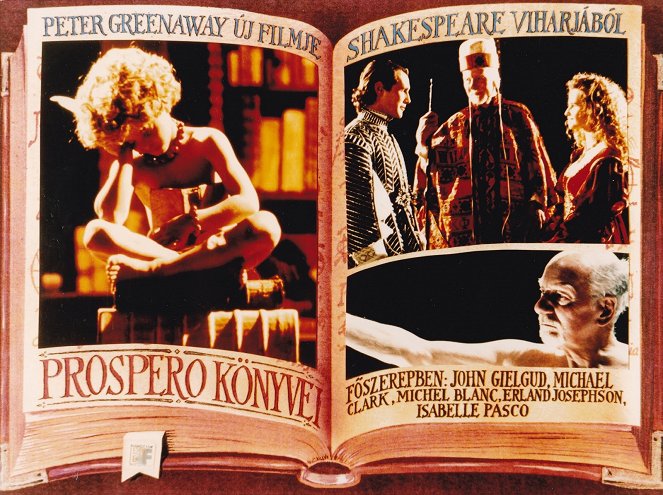Directed by:
Peter GreenawayCinematography:
Sacha ViernyComposer:
Michael NymanCast:
John Gielgud, Michel Blanc, Erland Josephson, Tom Bell, Kenneth Cranham, Mark Rylance, Pierre Bokma, James Thiérrée, Ute Lemper, Isabelle Pasco, Emil Wolk (more)VOD (1)
Plots(1)
Director Peter Greenaway's adaptation of Shakespeare's The Tempest is famous for it's intense production values, striking tableaux and interesting sound design. Prospero, once the Duke of Milan, now reigns over a faraway island, living there with his only daughter, Miranda. Twelve years earlier Prospero's brother, in league with the King of Naples, had exiled Prospero and his daugther from their home. One evening, Prospero imagines creating a storm powerful enough to bring his old enemies to his island. He being to write a play about his Tempest, speaking aloud the lines of each of the characters. (official distributor synopsis)
(more)Reviews (2)
“Renaissance collections aimed to show the connection between natural and artistic forms, the transitions between the wonders of nature and human creations. The Kunstkomora thus presented a vivid image of the world in its multiplicity and breadth, according to natural philosophy and magic principles, that "everything is contained in everything" (omnia ubique). (Description in Umprum) Greenaway's films are this kunstkomora, in which the microcosm of the author's artistic vision burdened by so many internal images through a dark room is projected into the macrocosm of baroque overflowing mise-en-scène, a kunstkomora that wants to say everything and indeed says everything: one film image is not enough, the superposition of images duplicates the leafing through of a book, which is the definitive inventory of all knowledge - in Greenaway's work, films need to be seen as a natural transition from book to film and vice versa, as writing and knowledge can be aestheticized at any moment and visuality can always be absorbed by the alchemy of words which "was at the beginning" of everything and from which the author's mannerism also arose, in which the sole essence of the divine demiurge - the director - manifests not only through the seven liberal arts but through all artistic forms within the reach of classical spirit.
()
Shakespeare's play "The Tempest" is difficult to put together in many ways and is rarely performed on stage. It must have been even worse to transfer it to the movie screen. Just putting together enough resources for such a demanding work and not losing one's artistic vision among the conflicting interests of co-producers must have been a difficult task. The result is a film that could be a highlight of many film festivals and a perennial favorite in the offering of film clubs, but it would definitely not succeed in regular distribution. The film was made even before the advent of video cameras, and therefore it is characterized by clear colors, sharp contrast, and overall great visual appearance. The artistic processing is, in the end, the reason why I lean toward a five-star rating because the whole film seems to be a tribute to the masters of visual arts. Overall impression: 90%. Prospero's Books is truly a film that is not suitable for everyone, and it has a relatively long runtime that is filled with poetic images rather than a dynamic plot.
()
Gallery (7)
Photo © Budapest Film


Ads